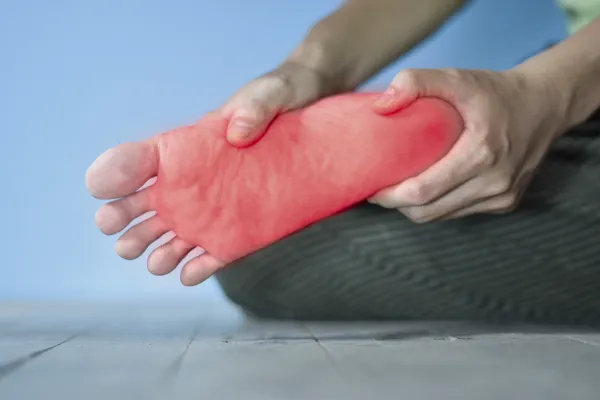Tips & Advice From Foot & Ankle Associates of Southern NH

The Connection Between Flat Feet and Plantar Fasciitis: What You Need to Know
Are you one of the many people who experience foot pain but aren’t sure why? If you have flat feet, you might be more susceptible to developing plantar fasciitis, a common condition that can leave you with persistent heel pain. In this post, we’ll explore the connection between flat feet and plantar fasciitis and discuss treatment options that can help you find relief.
What Are Flat Feet?
Flat feet, also known as pes planus, occur when the arches of the feet are low or absent. This means the entire sole of the foot comes into contact with the ground when standing. While some people are born with flat feet, others develop them over time due to factors like aging, injury, or excessive weight. Flat feet can lead to various issues, including pain and discomfort in the feet, ankles, and knees.
How Flat Feet Contribute to Plantar Fasciitis
Now, you may be wondering how flat feet relate to plantar fasciitis. The plantar fascia is a thick band of tissue that runs along the bottom of your foot, connecting your heel bone to your toes. When your foot has a normal arch, this tissue is under the right amount of tension. However, with flat feet, the arch is flattened, causing the plantar fascia to stretch more than it should. This increased tension can lead to microtears in the tissue, resulting in inflammation and pain—hallmarks of plantar fasciitis.
When the plantar fascia is under constant strain due to the lack of support from the arch, it can become irritated and inflamed. This is especially common in individuals who spend long hours on their feet, engage in high-impact activities, or wear improper footwear. If left untreated, plantar fasciitis can significantly impact your daily life, making simple activities like walking or standing uncomfortable.
Symptoms of Plantar Fasciitis
If you suspect that flat feet may be contributing to your foot pain, it’s essential to recognize the symptoms of plantar fasciitis. Common signs include:
Sharp pain in the heel, especially during the first steps in the morning or after sitting for long periods
Discomfort that worsens with activity or prolonged standing
Swelling and tenderness at the bottom of the foot
If you experience these symptoms, it’s important to seek professional advice for proper diagnosis and treatment.
Treatment Options
Fortunately, there are several effective treatment options for managing plantar fasciitis, especially when it is associated with flat feet. Here are some strategies to consider:
Custom Orthotics: Custom orthotic inserts can provide the necessary arch support to help distribute pressure evenly across your feet. This can alleviate strain on the plantar fascia and reduce pain.
Stretching Exercises: Regularly stretching your calf muscles and the plantar fascia itself can help improve flexibility and reduce tension. Simple stretches like calf stretches and rolling your foot on a tennis ball can make a significant difference.
Proper Footwear: Investing in supportive footwear is crucial for those with flat feet. Look for shoes with good arch support, cushioning, and a proper fit to help reduce strain on your feet.
Physical Therapy: A physical therapist can design a personalized exercise program to strengthen the muscles in your feet and legs, improving support for your arches and alleviating pain.
Anti-Inflammatory Treatments: Over-the-counter pain relievers and anti-inflammatory medications can help manage pain and reduce inflammation in the affected area.
Injections and Surgery: In more severe cases, corticosteroid injections may be recommended to reduce inflammation. Surgery is typically considered a last resort for those who do not respond to conservative treatments.
When to Seek Help
If you have flat feet and are experiencing persistent heel pain, it’s essential to consult a podiatrist. At Foot and Ankle Associates of Southern NH, we can evaluate your condition and recommend the best treatment options tailored to your needs. Early intervention can help prevent further complications and get you back on your feet.
Conclusion
Flat feet can significantly contribute to the development of plantar fasciitis, but understanding this connection is the first step toward finding relief. By recognizing the symptoms and exploring treatment options, you can effectively manage your foot pain and improve your quality of life. Don’t let flat feet hold you back—schedule an appointment with us today, and let’s work together to keep you moving comfortably!
Disclaimer. This blog post is intended for informational purposes only and should not be a substitute for professional medical advice. Always consult with a qualified physician to discuss your treatment options
Ask Foot & Ankle Associates of Southern NH And Their Team
Fill in the form to request a call from our team. One of our team members will call you for FREE and answer any questions or concerns you may have about your condition
Where To Find Foot & Ankle Associates of Southern NH

If you have any questions before scheduling an appointment or for general inquiries, please use the contact us button below. Our team will promptly reach out to assist you.
Opening Hours
Monday: 8:00am – 5:00pm
Tuesday: 8:00am – 5:00pm
Wednesday: 8:00am – 2:00pm
Thursday: 8:00am – 5:00pm
Friday: 8:00am – 2:00pm
Saturday: Closed
Sunday: Closed

